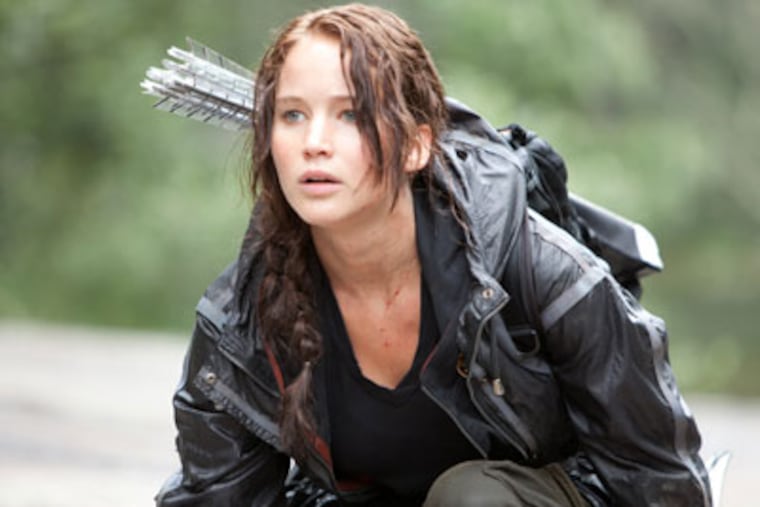Gary Thompson: Hollywood bounces back in 2012
HOLLYWOOD had a bounce-back year in 2012, mostly deserved. Movie attendance was up more than 5 percent to about 1.36 billion, as the industry did a good job giving folks what they wanted and often more than they expected.

HOLLYWOOD had a bounce-back year in 2012, mostly deserved. Movie attendance was up more than 5 percent to about 1.36 billion, as the industry did a good job giving folks what they wanted and often more than they expected.
And the year closes with a strong roster of movie-making talent on view - works by Steven Spielberg, Robert Zemeckis, Peter Jackson, Ang Lee, Quentin Tarantino, David O. Russell and Judd Apatow, with Kathryn Bigelow on the way in a few weeks.
The year also closes with the industry on the list of collateral suspects in the wake of recent tragedies like the one in Newtown, Conn., prompting questions about the role of popular culture.
But 2012 is also a rare case of the industry being in the position to defend itself on this score - this wasn't the usual pile of garbage, and maybe the uptick in attendance reflects that.
Looking down my roster of top-ten candidates, for instance, I see the teen genre film "Chronicle," the story of three high-school boys who acquire supernatural powers of telekinesis. It's a standard teen power fantasy premise, but one that takes on unusually meaty dimensions. The boys develop "rules" for deploying their powers, and as the stakes are raised, we see the movie challenge its target audience to think about placing life/death power in a moral framework. How would you safeguard it? How would you guard against destructive impulses? Would you confront a friend who'd lost control?
Filmmaker Martin McDonagh certainly soaks his movie "Seven Psychopaths" in violent imagery. But there's something else at work. This darkly funny story of an Irish screenwriter (Colin Farrell, a stand-in for McDonagh himself) concocting a Hollywood movie becomes a parable of a writer struggling with his own attraction to violence, recoiling when actual psychopaths (Sam Rockwell, Woody Harrelson) start writing the script for him.
In the massively successful sci-fi adventure "Hunger Games," a young woman (Jennifer Lawrence) survives a kill-or-be-killed Thunderdome spectacle by turning compassion into a virtue and turning the game against its oppressive organizers. (Her reward: starring opposite Bradley Cooper in David O. Russell's charming romcom "Silver Lining's Playbook.")
This was a good year for women like the one Lawrence played - often alone, getting by on little more than grit. And age was no object. Little Quvenzhane Wallis was a king-sized heroine in "Beasts of the Southern Wild," the independent, shoestring, DIY about a dying barrier-island man (Dwight Henry) who in his final weeks seeks to instill in his tiny daughter the virtues of self-reliance. Her father and her way of life are disappearing, but her fearlessness will never leave her.
Another highlight of the year is "Zero Dark Thirty," Kathryn Bigelow's account of a CIA agent (Jessica Chastain) who helped catalyze the hunt for Osama bin Laden and whose isolation in the male-dominated worlds of terror and counter-terror becomes one of the movie's subjects.
"Zero" has become hotly debated for its depiction of torture, and while the movie can be read in different ways, it certainly thrusts the issue in the face of its viewers.
Movies in general were eager to engage. "The Dark Knight Rises" took up the 1 percent/99 percent debate. "Magic Mike" was notorious for its beefcake, but it also looked at the way young people work multiple jobs these days to makes ends meet. Spielberg's "Lincoln" recounted his pragmatic attempts to push through the 13th Amendment and became an argument against the political extremism and gridlock of today.
The movie is an object lesson in leadership, a subject also at work in Zemeckis' riveting "Flight," anchored by Denzel Washington's performance as an airline pilot whose skill saves a doomed plane from killing all aboard but who must answer for being drunk when doing so.
It links leadership with accountability, a theme in the moving "How to Survive a Plague," a documentary about ACT UP activists pushing for effective HIV drugs. In the film's powerful epilogue, the principals talk with rare humility about their successes and failures.
There were several fine documentaries: "Queen of Versailles," "The Imposter," and the irresistible "Searching for Sugarman," the story of a Detroit singer who lapsed into obscurity even as his music helped transform South African society.
Hollywood even got religion in 2012, in Ang Lee's fantastical/spiritual "Life of Pi;" in the fantastical/spiritual/indecipherable "Cloud Atlas;" in "The Master," Paul Thomas Anderon's essay on spiritual hunger; and even in the quietly hilarious and subversive "Bernie." The latter is Richard Linklater's fact-based story of a funeral/choir director (Jack Black) so popular in his church-going Texas town, the locals seem prepared to let him slide on one of the commandments. And it's one of the big ones.
The top 10, in alphabetical order:
* "Bernie"
* "Beasts of the Southern Wild"
* "Chronicle"
* "Flight"
* "Life of Pi"
* "Lincoln"
* "Searching for Sugarman"
* "Seven Psychopaths"
* "Silver Linings Playbook"
* "Zero Dark Thirty"